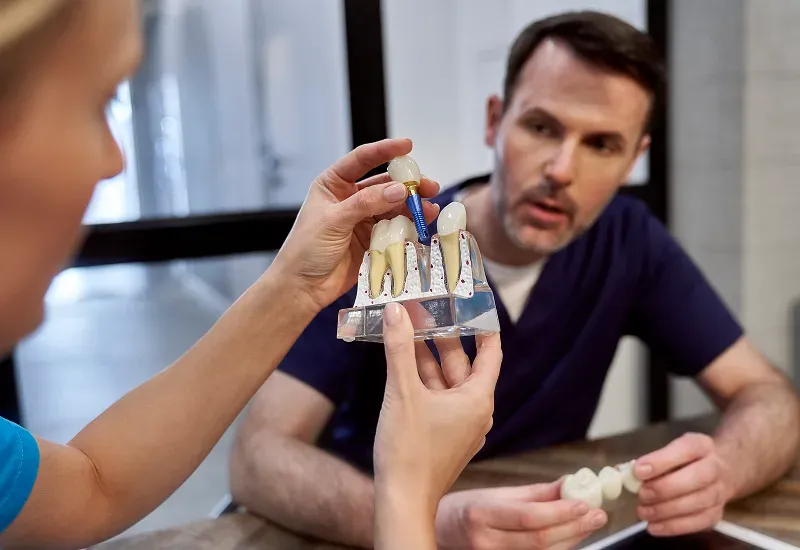
Is a Root Canal Painful? What Modern Dentistry Really Feels Like?

1 July 2025
If you have ever heard someone talk about a root canal, you might have felt a bit scared. Many people fear root canals because of stories and myths that have been shared over the years. Some have heard about painful experiences or seen movies that make dental procedures look really uncomfortable. However, it’s important to know that these stories often don’t reflect what happens in today’s dentistry.
The truth is that many people think root canals are painful and uncomfortable. But what exactly the root canal pain level is? Let’s take a closer look at what a root canal actually involves and how modern dentistry has changed things for the better.

An Unfiltered Look at Root Canal Experience
Root canal treatment is a procedure that helps fix an infected tooth. It removes the infected pulp inside the tooth, relieves pain, and helps restore the tooth's health. However, before knowing does a root canal hurt, what actually happens during this treatment?
Is A Root Canal Painful?
Many people worry that the procedure itself will be painful. However, today's dentists use local anesthesia to numb the area around the tooth. This means you should feel little to no pain during the procedure.
While some discomfort is possible after a root canal, it is generally manageable with over-the-counter pain relief. Most patients report that any pain they experience is far less intense than the toothache they had before the procedure. People often assume that root canals take hours. In reality, they usually take about one to two hours, depending on the complexity of the case.
Factors That Can Impact the Root Canal Experience
Several factors can affect how comfortable your root canal experience is. By keeping these in mind, you can work with your dentist to ensure a smooth and pain-free procedure.
Communication and Trust
Good communication and building trust with your dentist are key to a successful root canal. By sharing your concerns, fears, and how much pain you can handle, your dentist can create a treatment plan and pain management approach that suits your needs.
Dentist’s Expertise
The skill and experience of your dentist can also influence your experience. An experienced dentist can perform the procedure efficiently, reducing discomfort and leading to better results.
Tooth Condition and Complexity
The severity of the infection, how complex the tooth's condition is, and how much decay there is can affect how long the root canal takes and how much discomfort you might feel. Teeth that are severely damaged may need extra appointments or referrals to specialists, which can lengthen the overall treatment time.
Symptoms That Indicate You Might Need a Root Canal
Noticing the signs that you may need a root canal can help you avoid prolonged discomfort and prevent further dental problems. Here’s what to look out for:
- Tooth Sensitivity: Do you feel a sharp pain when drinking hot coffee or eating ice cream? If your tooth is sensitive to hot or cold temperatures and this doesn’t go away, it could be a sign of a deeper issue, like an infected pulp.
- Severe Pain: Ongoing or severe tooth pain is a clear sign that something is wrong. This pain may feel like constant throbbing or sharp, stabbing sensations. It often indicates an infection inside the tooth that needs immediate attention. As noted by the Cleveland Clinic, you should never ignore ongoing tooth pain since it may require a root canal to remove the source of the infection.
- Gum Swelling: Swelling around a tooth can be a warning sign. If your gums are swollen, tender, or puffy, it might mean there's an underlying infection. This swelling often comes with tenderness and can sometimes lead to pus drainage, indicating an urgent need for dental care.
- Abscess: An abscess is a serious sign that you may need a root canal. This is an infection that creates a pocket of pus around the root of the tooth. Symptoms of an abscess include severe pain, swelling, and even fever. If you see a pimple-like bump on your gums, it could be an abscess that needs quick treatment to stop the infection from spreading.
Modern Root Canal Treatment for Pain-Free Experience
Modern dentistry makes it easier than ever to manage pain during and after root canal. Here is how modern root canal treatment practices are making the treatment pain-free and less exhausted.
Local Anesthesia for Pain-Free Experience
First, your dentist will give you a local anesthetic to numb the tooth and the area around it, so you don't feel any pain. Then, they will access the pulp chamber of the tooth. This means they will make a small opening to clean and disinfect the roots of the tooth. After that, they will fill the inside of the tooth with a rubber-like material called gutta percha to seal it up. Finally, the dentist will put a filling or a crown on the tooth to restore its shape and function.
The time it takes to complete a root canal can vary based on a few factors, like how complicated the case is, how many root canals there are, where the tooth is located, and the dentist's experience. On average, a root canal usually takes about 1 to 2 hours to finish.
Sedation Dentistry for Easing Your Nerves
For people who feel scared or anxious about dental work, sedation dentistry can help make the root canal process more comfortable. Depending on your needs, your dentist might offer different types of sedation, like oral sedation, nitrous oxide, or intravenous (IV) sedation. These methods help you feel relaxed and calm, making the experience easier and pain-free.
Managing Dental Anxiety
If you feel anxious about getting a root canal, you can manage that anxiety with the support of caring dental professionals. They can explain the procedure in detail, so you know what to expect at each step. This understanding can help reduce your anxiety and make you feel more in control. Be sure to talk to your dentist about your concerns and preferences, so they can help you find the best way to manage your anxiety during the treatment.
"The best and cheapest dentistry is when the right thing is
done extremely well the first time and it lasts for a long time."
Preparing for a Root Canal: What You Should Know?
If you find out that you need a root canal, being prepared can help ease your anxiety. Here are some things to consider before your appointment.
Discuss Your Concerns
Before the procedure, don’t hesitate to share any worries or questions you have with your dentist. They can provide information about what to expect and help you feel more comfortable.

Need Any Help?
Contact UsPlan Your Day
Schedule your appointment at a time when you can relax afterward. Consider taking the rest of the day off work or arranging for someone to drive you home if you’re feeling anxious.
Follow Pre-Procedure Instructions
Your dentist may provide specific instructions to follow before your appointment, such as not eating for a few hours beforehand. Make sure to follow these guidelines to ensure everything goes smoothly.
Bring a Comfort Item
Consider bringing something to help you feel more relaxed. You can consider bringing items like headphones to listen to music or a stress ball to squeeze during the procedure.
Final Thoughts
The fear of root canals often comes from misunderstandings and outdated beliefs. Most patients now understand that the reality of a root canal is far less worrying than what they believed. This is true especially due to modern dentistry techniques and approaches.
If you are facing a root canal, remember that it is a common procedure which is designed to save your tooth and relieve pain. With the right care, you can move beyond your fears and achieve a healthier and brighter smile. So, if you find yourself in a situation where a root canal is necessary, rest assured that you are in good hands with modern dental practices.
Contact your Dentist today, Dr. Aja at One Dental SF, learn more about Is a Root Canal Painful? What Modern Dentistry Really Feels Like?
Resource:
Disclaimer
*This media/content or any other on this website does not prescribe, recommend, or prevent any treatment or procedure. Therefore, we highly recommend that you get the advice of a qualified dentist or other medical practitioners regarding your specific dental condition. *